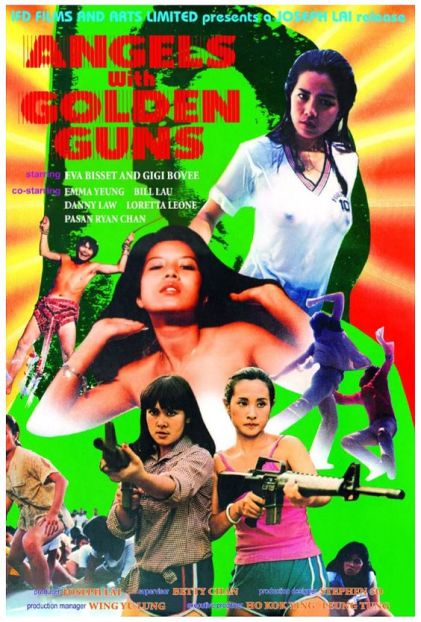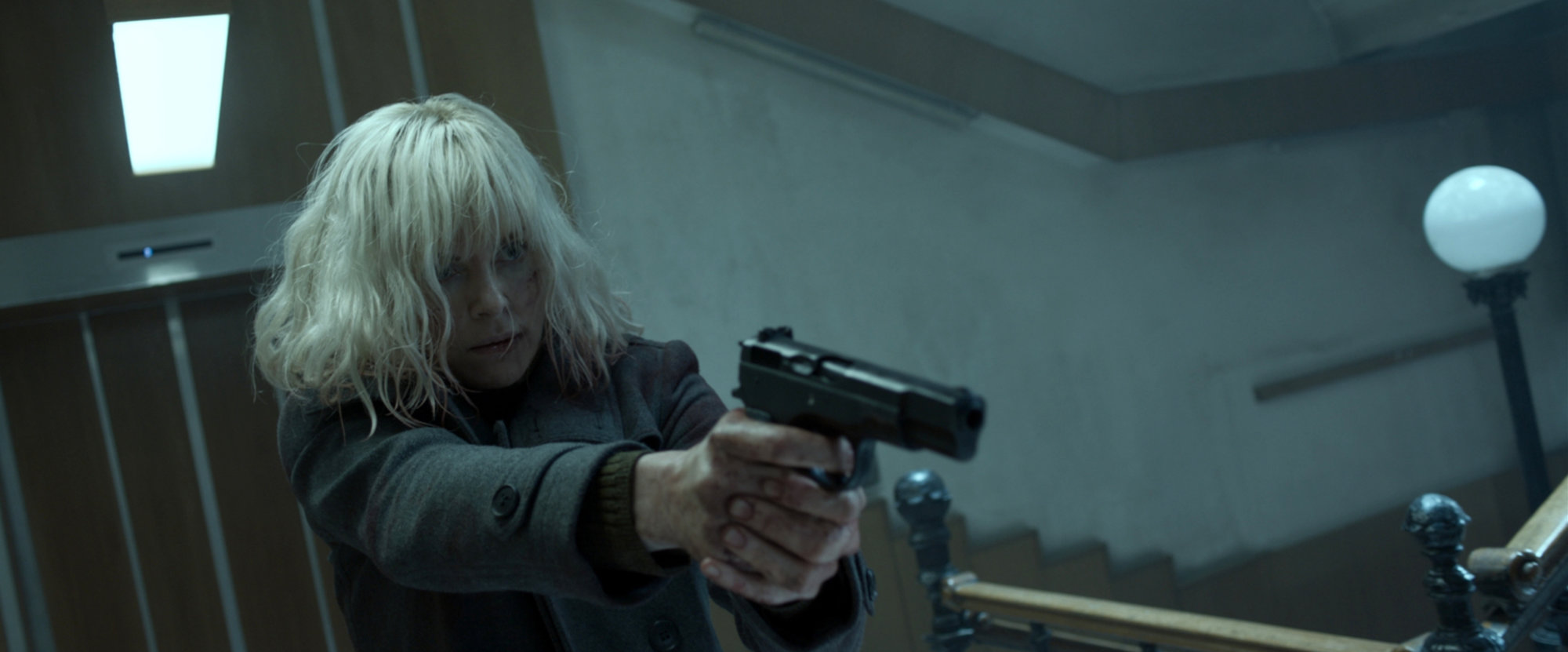 ★★★★½
★★★★½
“Truly a nuclear option.”
 Ladies and gentlemen, we have a new action queen in town. With Angelina Jolie apparently abdicating that title after Salt, the throne was vacant. Theron had already made a very solid case in Mad Max: Fury Road, then solidified it in The Huntsman: Winter’s War. But there were still doubts: could she hold the true focus of a genuinely action-driven film? There are doubts no more, for Atomic Blonde gives us Theron in the role of Lorraine Broughton, the baddest-ass heroine since The Bride in the first Kill Bill.
Ladies and gentlemen, we have a new action queen in town. With Angelina Jolie apparently abdicating that title after Salt, the throne was vacant. Theron had already made a very solid case in Mad Max: Fury Road, then solidified it in The Huntsman: Winter’s War. But there were still doubts: could she hold the true focus of a genuinely action-driven film? There are doubts no more, for Atomic Blonde gives us Theron in the role of Lorraine Broughton, the baddest-ass heroine since The Bride in the first Kill Bill.
She’s an agent of British intelligence, sent to Berlin in the very last days of the Communist regime. Her mission is to retrieve a list which details the identities of every Soviet agent in the field, provided by a Russian defector. Before she has even met her contact there, David Percival (McAvoy), chief at the Berlin station, Broughton has been made by the Russians. Turns out, they have a mole, codenamed “Satchel”, who will stop at nothing to prevent the list from making it into Western hands, thereby revealing their identity. The exhortation of one of her bosses on her way out the door in London, “Trust no-one,” proves to be entirely accurate, as she makes her way across a landscape formed largely of moral rubble from the imminently collapsing Berlin Wall.
The story unfolds in flashback, during a debriefing in London, in which a severely battered Broughton recounts the events that unfolded as she tried to track down the list – and when that proves impossible, the defector, since he claims to have memorized its contents. It’s a perpetually shifting quicksand of allegiances, not least Percival, who has been in the city so long as to have “gone native”. There’s also Delphine Lasalle (Boutella), a French agent for whom Broughton falls, though it’s never clear whether their resulting spot of canoodling is for the purposes of her mission. It’s certainly not difficult on the eye [Boutella may be an action heroine to watch in future, having impressed both as the spring-loaded Gazelle in Kingsman: The Secret Service and one of the better things about recent Tom Cruise vehicle, The Mummy].
If you’ve seen the trailer, you’ll know why this was my most anticipated film of the year, and the action is every bit as slickly brutal as you’d expect from the co-director of John Wick – Leitch wasn’t credited there because the Directors’ Guild of America don’t like dual credits. This is ferociously hard-hitting stuff, clear from the opening scene, and escalating steadily thereafter. Broughton’s credentials are equally apparent immediately, as she escapes a kidnap attempt on the way from Berlin Airport, brawling her way viciously out of a car’s back seat. Yet this is merely an appetizer for what is to come, and one sequence in particular.
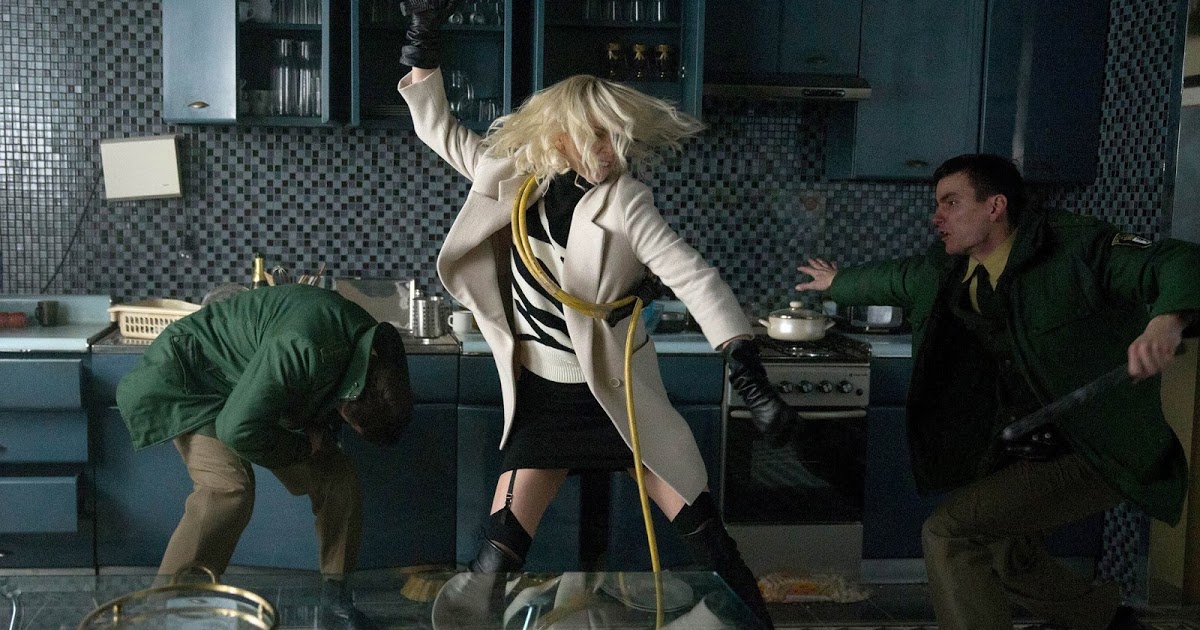
The scene in question sees Broughton escorting the defector, who has already been wounded. They take refuge in an apartment building only to be followed there by a bevy of Russian agents, whom she has to fend off with bullets, fists and even a convenient corkscrew. It’s nine minutes long, and appears to be shot in a single, unbroken take. Key word “appears” – if you look closely, you will likely be able to spot the moments where they cleverly blend the shots (about 20 or so, according to Leitch) together while the camera pans, tracks and zooms through the building. It’s still likely the most intense and hardcore battle in action heroine history, with the participants selling every blow impeccably. This is awesome, ground breaking stuff, and I haven’t enjoyed a scene so much since – again – Kill Bill, Volume 1.
For I’ve seen hard-hitting and inventively choreographed fights before. I’ve seen well-shot and technically impressive fights before. It’s the combination here which is almost unparalleled. Maybe the duel between Michelle Yeoh and Zhang Zi Yi in Crouching Tiger is the only one that comes close, though it had a very different kind of artistry, one that was based on grace and fluidity. [Outside our genre, I was additionally reminded of the car chase in Children of Men, which was apparently an inspiration] This is Lorraine Broughton, doing absolutely whatever she needs to survive, from second to second and moment to moment. It’s raw, animalistic and moves the bar for future action heroines to an entirely new level.
This is actually a problem, because it there’s still a good chunk of the film to go, and nothing the rest of the way comes close. As a result, there’s a sense of letdown from the adrenaline high, even if the final attempt of the Russians to kill Broughton is by no means bad. I’m hard pushed to find anything else of much significance to criticize here. We’ve got an Oscar-winning actress going full-on into the old ultraviolence? What’s not to love? Admittedly, the actual spy plot is a good deal less inventive and original than just about every other aspect here. But it’s merely a backdrop, the canvas on which Leitch and Theron paint their bloody masterpiece. Oh, and if you can’t get permission to use Ministry’s version of Stigmata, find something else. Do not use Marilyn Manson to cover it. He is not Al Jourgensen.
Otherwise, though, I should devote a full paragraph to the soundtrack, since it kicked ass, almost as much as Charlize. I’m a child of the eighties. It was the soundtrack to my teenage and college years, and I even spent some time in Berlin, on both side of the wall, in the middle of the decade. While that would be a couple of years before the events depicted here, it still brought back a heck of a lot of memories. Part of this might be the music, which plays like they rifled my CD collection. It starts with New Order’s Blue Monday, then segues into the opening credits which play out over David Bowie’s theme from Cat People, as Broughton stalks through the London streets. If not the first time that has been purloined for another movie – Quentin Tarantino used it, inexplicably, for World War 2 movie Inglourious Basterds – it works a lot better here. Consider me sold.
This is an action heroine in its most literal of terms. Broughton has often been compared to James Bond, yet she’s even more cool, detached and almost emotionless in some ways. It absolutely deserves a franchise, with its central character chewing her way through post-Cold War history like a shark in human form, always moving forward – and if you get in the way, it will end up the worse for you. Every step is absolutely purposeful and deliberate, a means to an end, and that end is her mission. Broughton does not fuck around, and neither does this film. Such single-minded determination can only be applauded.
Dir: David Leitch
Star: Charlize Theron, James McAvoy, Sofia Boutella, Toby Jones

 If you ever wanted to see Denise Richards brawl with MMA star Chuck Liddell, or even the daughter of Frasier, this film delivers. For Richards plays FBI hostage negotiator, Gretchen Blair, who is being ignominiously sent back to Washington after willfully disobeying orders during a siege. She ends up sitting next to the increasingly-nervous Terry (Barker), who offers her $50 million if she helps him get off the plane alive. For he knows it’s about to be hijacked by Matthew Sharpe (Lundgren) and his cronies, who will stop at nothing to retrieve the item which Terry took from them. It’s up to Gretchen, with the dubious help of an air marshal on his third solo flight, to stop their plan.
If you ever wanted to see Denise Richards brawl with MMA star Chuck Liddell, or even the daughter of Frasier, this film delivers. For Richards plays FBI hostage negotiator, Gretchen Blair, who is being ignominiously sent back to Washington after willfully disobeying orders during a siege. She ends up sitting next to the increasingly-nervous Terry (Barker), who offers her $50 million if she helps him get off the plane alive. For he knows it’s about to be hijacked by Matthew Sharpe (Lundgren) and his cronies, who will stop at nothing to retrieve the item which Terry took from them. It’s up to Gretchen, with the dubious help of an air marshal on his third solo flight, to stop their plan.




 This crisp little Argentinian film clocks in at 70 minutes – not even enough to be considered a feature by the Screen Actors Guild. You’ll understand, therefore, there isn’t much fat on its bones. Virginia (Cardinali) has left her husband, taking daughter, Rebecca (Duranda), with her. But a moment’s inattention at a gas-station proves fatal, as Rebecca is abducted, and Virginia’s car driven off the road during the subsequent pursuit. Brought back (from the dead?) by a mysterious stranger (Ferro), she is told Rebecca has been chosen by a religious cult as a sacrifice. It’s up to Virginia to stop them, and she can let no-one get in her way. Which becomes an issue, for we quickly find out, she is not the only mother looking to recover a child from the cult – and, it appears, only one can succeed.
This crisp little Argentinian film clocks in at 70 minutes – not even enough to be considered a feature by the Screen Actors Guild. You’ll understand, therefore, there isn’t much fat on its bones. Virginia (Cardinali) has left her husband, taking daughter, Rebecca (Duranda), with her. But a moment’s inattention at a gas-station proves fatal, as Rebecca is abducted, and Virginia’s car driven off the road during the subsequent pursuit. Brought back (from the dead?) by a mysterious stranger (Ferro), she is told Rebecca has been chosen by a religious cult as a sacrifice. It’s up to Virginia to stop them, and she can let no-one get in her way. Which becomes an issue, for we quickly find out, she is not the only mother looking to recover a child from the cult – and, it appears, only one can succeed. While the lack of resources is frequently and painfully obvious, I’m inclined to look kindly on this. My tolerance is due to the abiding love for our genre possessed by writer-director Krueger, shown in the influences, both obvious and subtle, on display here. From Faster Pussycat to Female Prisoner 701, he seems like the kind of man whose DVD collection reflects my own. Hell, despite being set in America, a character here even uses the greeting stance beloved of bad girls in pinky violence movies: knees bent, right arm outstretched, palm up. I can’t truly hate a film made by someone who knows what that is.
While the lack of resources is frequently and painfully obvious, I’m inclined to look kindly on this. My tolerance is due to the abiding love for our genre possessed by writer-director Krueger, shown in the influences, both obvious and subtle, on display here. From Faster Pussycat to Female Prisoner 701, he seems like the kind of man whose DVD collection reflects my own. Hell, despite being set in America, a character here even uses the greeting stance beloved of bad girls in pinky violence movies: knees bent, right arm outstretched, palm up. I can’t truly hate a film made by someone who knows what that is. ★★★★½
★★★★½ Ladies and gentlemen, we have a new action queen in town. With Angelina Jolie apparently abdicating that title after Salt, the throne was vacant. Theron had already made a very solid case in Mad Max: Fury Road, then solidified it in The Huntsman: Winter’s War. But there were still doubts: could she hold the true focus of a genuinely action-driven film? There are doubts no more, for Atomic Blonde gives us Theron in the role of Lorraine Broughton, the baddest-ass heroine since The Bride in the first Kill Bill.
Ladies and gentlemen, we have a new action queen in town. With Angelina Jolie apparently abdicating that title after Salt, the throne was vacant. Theron had already made a very solid case in Mad Max: Fury Road, then solidified it in The Huntsman: Winter’s War. But there were still doubts: could she hold the true focus of a genuinely action-driven film? There are doubts no more, for Atomic Blonde gives us Theron in the role of Lorraine Broughton, the baddest-ass heroine since The Bride in the first Kill Bill.

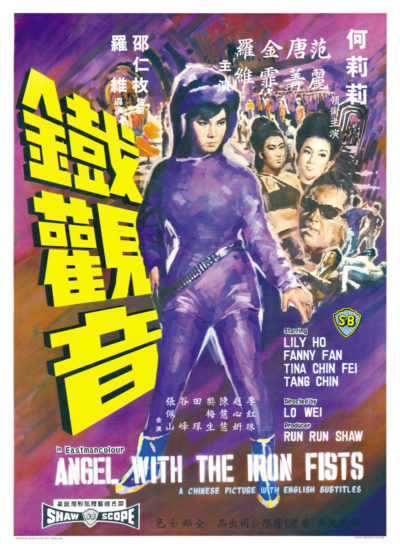 Swinging wildly between the surprisingly smart and the brain-numbingly stupid, this 1967 Hong Kong film is, in the end, not much more than a bad James Bond knock-off, despite its female lead. The heroine, Luo Na (Ho), is unsubtly named Agent 009, and goes to Hong Kong, posing as the mistress of an imprisoned gangster, who supposedly knows where he hid his ill-gotten gains. This brings her to the attention of the Dark Angels, whose leader is played by Tina Chin-Fei. This is a surprisingly gynocentric organization, owning both a vast, sprawling, underground lair and fetching two-piece uniforms. Keen to find out what Lona knows, they recruit her – which was 009’s cunning plan all along.
Swinging wildly between the surprisingly smart and the brain-numbingly stupid, this 1967 Hong Kong film is, in the end, not much more than a bad James Bond knock-off, despite its female lead. The heroine, Luo Na (Ho), is unsubtly named Agent 009, and goes to Hong Kong, posing as the mistress of an imprisoned gangster, who supposedly knows where he hid his ill-gotten gains. This brings her to the attention of the Dark Angels, whose leader is played by Tina Chin-Fei. This is a surprisingly gynocentric organization, owning both a vast, sprawling, underground lair and fetching two-piece uniforms. Keen to find out what Lona knows, they recruit her – which was 009’s cunning plan all along. This is confusing. For the IMDb
This is confusing. For the IMDb  Teetering on the edge of qualifying as false information, this TVM was originally released under the more relevant, yet great deal less salacious (and, let’s be honest, less appealing) title of A Nanny’s Revenge, along with a greatly subdued sleeve. Marketing works, people: for put it this way, I’d never have watched it in that presentation. I can’t feel
Teetering on the edge of qualifying as false information, this TVM was originally released under the more relevant, yet great deal less salacious (and, let’s be honest, less appealing) title of A Nanny’s Revenge, along with a greatly subdued sleeve. Marketing works, people: for put it this way, I’d never have watched it in that presentation. I can’t feel 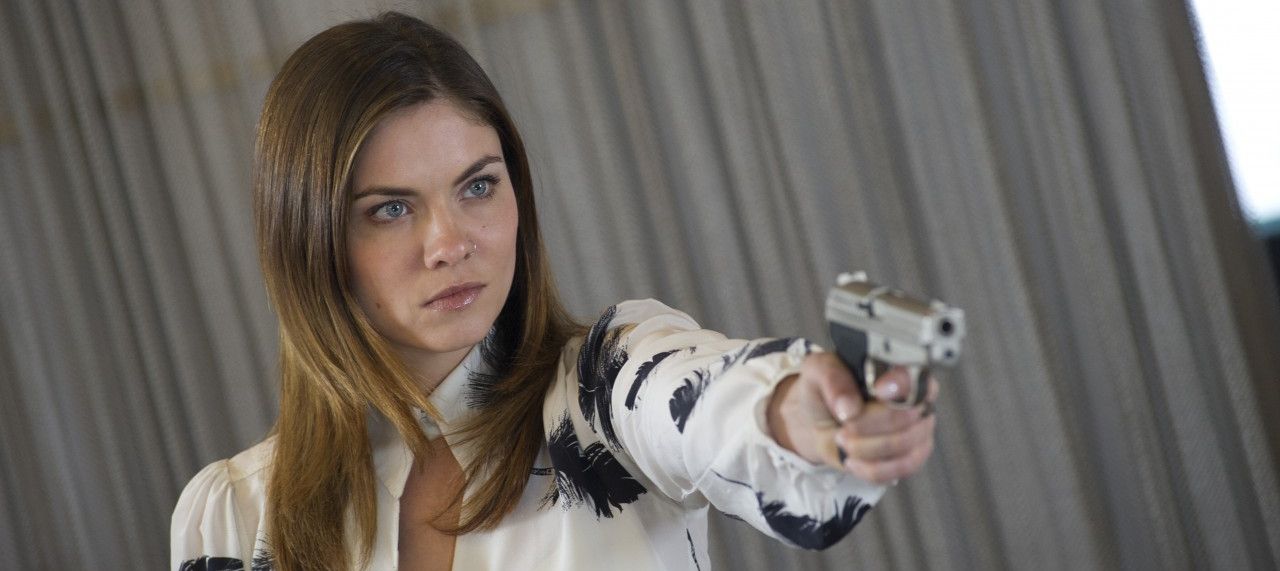
 There’s something admirable about a film entirely cast with and directed by women, especially in such a generally male-dominated genre as horror. Unfortunately, all this effort really goes to prove, is that the fairer sex are every bit as capable of turning out uninteresting crap as any man. An ill-conceived cross between The Descent and The Blair Witch Project, this has four old school friends reuniting, along with the workmate of one of them, who tags along because… Well, as with so much in the movie, for no particularly good reason. There’s friction between the friends, from the moment Nancy (Bernadette) shows up four hours late, forcing their departure to be pushed back.
There’s something admirable about a film entirely cast with and directed by women, especially in such a generally male-dominated genre as horror. Unfortunately, all this effort really goes to prove, is that the fairer sex are every bit as capable of turning out uninteresting crap as any man. An ill-conceived cross between The Descent and The Blair Witch Project, this has four old school friends reuniting, along with the workmate of one of them, who tags along because… Well, as with so much in the movie, for no particularly good reason. There’s friction between the friends, from the moment Nancy (Bernadette) shows up four hours late, forcing their departure to be pushed back. One year ago, the boyfriend of Emily Wilks (Davis) vanished, along with the mountaineering party he was taking on an ascent of the notoriously lethal Devil’s Peak summit. Emily is no mean climber herself, and still works as a trail guide on the mountain. But the group who have booked her services on this day have another motive: finding the legendary stash of gold they believe is hidden on the mountain, which they believe Emily knows the location. Unable to convince them it’s just a myth, she’s forced to lead the gang through the wilderness. Fortunately, it has many,
One year ago, the boyfriend of Emily Wilks (Davis) vanished, along with the mountaineering party he was taking on an ascent of the notoriously lethal Devil’s Peak summit. Emily is no mean climber herself, and still works as a trail guide on the mountain. But the group who have booked her services on this day have another motive: finding the legendary stash of gold they believe is hidden on the mountain, which they believe Emily knows the location. Unable to convince them it’s just a myth, she’s forced to lead the gang through the wilderness. Fortunately, it has many, 

